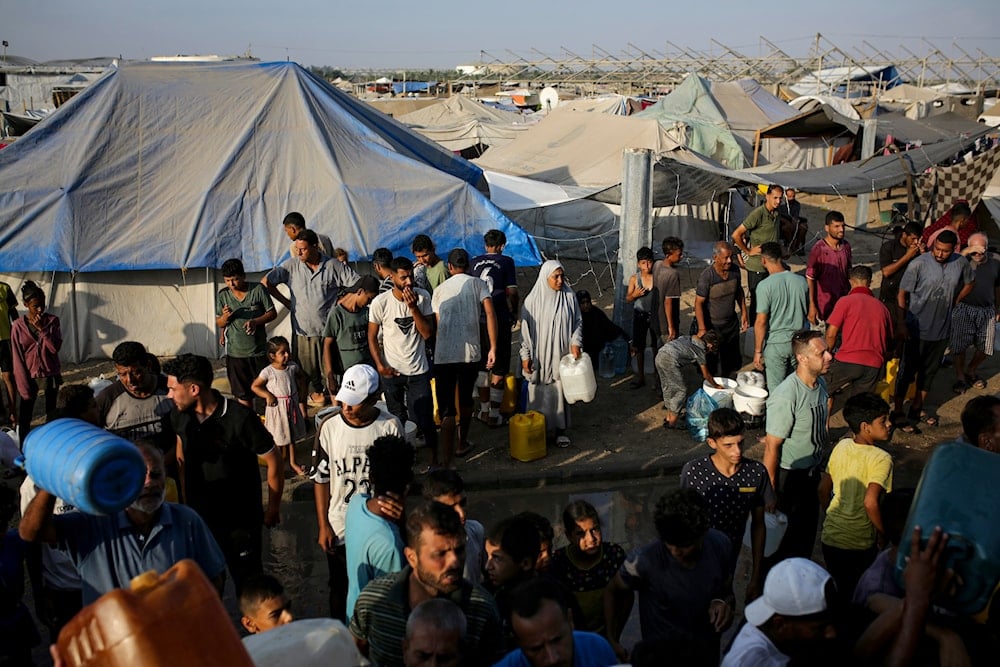Flies, mosquitoes infest Gaza water amid bombing and sewage hazards
The potential of cholera and other more deadly diseases spreading like epidemics continues to be highlighted by UN agencies time and time again.
-

Palestinians displaced by the Israeli bombardment of the Gaza Strip queue for water at a makeshift tent camp in the southern town of Khan Younis, Monday, July 1, 2024. (AP)
The intense smell of sewage, which is becoming more and more of a hazard, coupled with the ongoing genocide, is an unfortunate everyday occurrence in Umm Nahed Abu Shar's tent in a Gaza camp at every meal.
The Gaza Strip is "drowning" in hundreds of thousands of tons of uncollected human waste and debris from the war on Gaza, according to a report released on Thursday by a European activist group. This situation might quickly extend to the neighboring region.
In the central Gazan city of Deir el-Balah, where authorities announced this week that wastewater treatment plants had gone offline because of the lack of fuel, Abu Shar and her family are experiencing a nightmare in their tent amid rising summer temperatures.
"We are just suffering; we are not living," Abu Shar told AFP, adding, "The heat, the diseases, the flies, the mosquitoes and their hissing, it all hurts us".
Read next: 'Israel' is weaponizing water against Gaza - Report
"We don't sleep at night because of the smell of sewage. My children do not sleep because they are always ill with something spread by the waste."
Doctors report that lice, scabies, chicken pox, skin rashes, alongside hunger that has been prevalent in Gaza since the conflict began on October 7 are also rapidly spreading.
The potential of cholera and other more deadly diseases spreading like epidemics has been highlighted by UN agencies time and time again.
'Chemical debris soups'
Muhammad al-Kahlot of the Palestinian Red Crescent in Gaza says that for the past week, a fire has been burning on one dump in Al-Mawasi, a massive tent city next to Khan Yunis which emergency services have been unable to stop.
"We are suffocating from the foul smell of waste, the smoke and the heat," he expressed.
In a recent research, the Dutch activist group Pax revealed that Gaza's outdated trash collection system had been completely destroyed by "months of continuous bombing" and "Israel's" fuel blockage.
"Local authorities report that the Israeli Defense [occupation] Forces are preventing access to Gaza's three official landfills", he added.
Pax analyzed satellite photos that revealed 225 expanding waste sites around Gaza.
A "chemical soup" of debris and heavy metals, according to the group, could pollute farms and water sources, and "eventually toxic substances penetrate the food chain and find their way back to humans".
Pax cautioned that the threat might extend beyond of the war zone since water can "migrate over long distances."
"While the danger for Gaza is imminent, the overall region could soon confront grave ecosystem and public health problems", it continued.
Data back in May revealed that 53% of the 603 examined water facilities were either destroyed or damaged. Water in the Gaza Strip was already a limited resource dependent on a network of water wells and desalination plants before "Israel" further exacerbated its scarcity.
Read more: Humanitarian crisis in Gaza worsens amid ongoing Israeli aggression

 3 Min Read
3 Min Read










